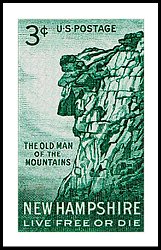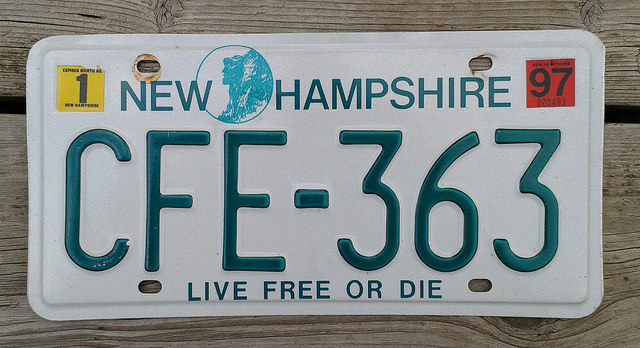New Hampshire v DOJ Wire Act Lawsuit Update: The Skirmish Over ‘Whoever’
The ongoing legal battle pitting the State of New Hampshire against the DOJ and its January 2019 reversal opinion regarding the reach of the 1961 Wire Act has picked up speed in recent weeks, with presiding US District Judge Paul J. Barbadoro presiding over a flurry of motions, countermotions, preliminary hearings, court orders and more. One of the most unusual items among recent developments in the case was a supplemental filing this week by the New Hampshire Lottery Commission involving the US’s legal definition of the word “whoever”.
It turns out that whoever “whoever” is, in the legal sense, is quite a big deal, even though in this case it’s another example of the DOJ, as the defendant, attempting to fling shit at the wall to see what might stick. According to an amicus filing presented by the noxious, Sheldon Adelson-financed Coalition to Stop Internet Gambling (CSIG), “whoever” means literally anybody and everybody.
Truly, the Wire Act literally starts with the word “whoever”. Here’s the statute’s very first paragraph:
(a) Whoever being engaged in the business of betting or wagering knowingly uses a wire communication facility for the transmission in interstate or foreign commerce of bets or wagers or information assisting in the placing of bets or wagers on any sporting event or contest, or for the transmission of a wire communication which entitles the recipient to receive money or credit as a result of bets or wagers, or for information assisting in the placing of bets or wagers, shall be fined under this title or imprisoned not more than two years, or both.
 However, it’s one of the primary canons involving the roles of government and the law that the word “whoever” applies to private entities, typically people, but also including entities such as corporations, churches and lots of other things as well. But what are not considered as “whoever”-style entities are governments themselves, nor the people who work for them in the course of carrying out their governmental duties.
However, it’s one of the primary canons involving the roles of government and the law that the word “whoever” applies to private entities, typically people, but also including entities such as corporations, churches and lots of other things as well. But what are not considered as “whoever”-style entities are governments themselves, nor the people who work for them in the course of carrying out their governmental duties.
Indeed, it’s part of why lawsuits against governmental entities typically name as a defendant the prominent individuals associated with that entity. This lawsuit, for instance, is titled “New Hampshire Lottery Commission, et al. v. William Barr, in his official capacity as Attorney General of the United States of America, et al.” Obviously, the suit isn’t against Barr; it’s against the US Attorney General’s division of the DOJ.
Yet traipsing into this comes Adelson’s CSIG, claiming against two and a half centuries of American judicial history that “whoever” applies within the confines of the Wire Act’s reach to states as well as private persons. It’s of course a farcical concept, and it was probably introduced by CSIG to allow the USAG a claim of plausible deniability regarding frivolous claims, but it still accomplishes Adelson’s and the DOJ’s greater goal: To muck up the legal works as long as possible. What’s even funnier about CSIG’s claims is that the rest of the Wire Act mentions “States” specifically, several times, among the sovereign entities who can establish laws that allow for the transmission of gambling information across state lines. It’s this very inclusion that allowed for the startup of the US’s multi-state lotteries many years ago.
Presiding judge Barbadoro, to his credit and diligence, ordered the state of New Hampshire to file a response to the CSIG claims, and this is the 12-page supplemental memorandum filed this week. Counsel for New Hampshire wasted little time in shredding CSIG’s “whoever” assertions, and though Barbadoro hasn’t ruled on this specific matter yet, it’s already little more than comic relief.
First, the state’s memo details the long history of the legal protections afforded governmental entities, including the people and agencies tasked with carrying out a government’s directives. That includes the New Hampshire Lottery Commission and its officials, who operate under New Hampshire’s governmental auspices.
One high-profile case from a couple of decades back makes an appearance, that being the lawsuit filed by Mohammed al Fayed, the father of Dodi Fayed, who perished in a Paris car crash along with Princess Diana while fleeing a pack of paparazzi. Al Fayed sued the CIA in his search for incriminating material against someone, somewhere, but the CIA ultimately prevailed and was not forced to comply with discovery requests — if the agency even had anything — because the CIA was not a “person” from whom al Fayed could force discovery.
The formal definition of “whoever” is closely tied to that of “person”, and it cuts both ways.
It all comes together with this statement by New Hampshire’s counsel: “[B]ecause State-conducted lottery activity is not criminal under 18 U.S.C. § 1084 [the Wire Act], then those who facilitate it, whether state actors or private vendors, are likewise outside the statutory prohibition. To hold otherwise would leave States without the ability to raise important, needed revenues to fund the operations of State government through the use of State-controlled lotteries. Accordingly, this Court should declare that non-state actors engaged by a lawful State lottery enterprise cannot be among those “whoevers” who could be deemed to
violate the Wire Act.”
The New Hampshire filing further rends the CSIG claim with this: “The argument made for the first time at the April 11, 2019 hearing by the amicus Coalition to Stop Internet Gambling – that if a state agency raises revenue for a State in a particular way, then Congress somehow intended to include that agency within the ambit of the term ‘whoever’ – does not find support in the law.” That really cuts to the core of the falsehoods being perpetrated upon the American public, namely that because gambling is involved, special rules should apply, and Adelson and his billions get to make those rules, courtesy of the DOJ.
Chutzpah aside, it’s still a grand chuckle.




















COMMENTS